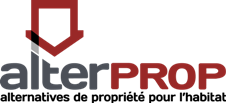Call for papers
INTERNATIONAL SYMPOSIUM
ALTERNATIVE FORMS OF HOME OWNERSHIP
Download the text of the call for papers
Access to housing is one of the major issues facing us today. Previously, it was essentially a problem affecting people on low incomes, but today the middle classes are also finding it difficult not just to purchase property but to find comfortable housing. The housing issue is thus at the heart of public policy proposals, partisan or activist rhetoric, and the debate about western democracy in general. Alternative ways of living, in a fairer world with greater solidarity and a revival of representative democracy, is one of the main focuses of current alternative thinking.
Alter-Prop has specifically investigated the crucial question of home ownership. The concept of private property, which was for long seen as a cornerstone of citizenship and democracy, has been challenged by practices such as collective ownership, possession through use, long-term rental, or shared, joint, cooperative ownership, etc. ‘Third sector’ approaches (voluntary, professional, participatory, etc.), even a total rejection of the State, have emerged, challenging the western model of ownership, notably in the name of the social and solidarity economy and sustainable development.
These new debates, which are at the same time political, economic and environmental, have emerged as a reaction against rampant individualism, calling for a revival of sociability, solidarity and community, and opposing legal measures and practices that preserve private ownership and generally block ideas of collective ownership and of sharing living spaces.
The symposium on ‘Alternative forms of Home ownership’ will examine these social, legal and political issues, around three themes:
1: Living differently: pooling, sharing, rethinking places to live
2: Sustainable development alternatives: social cohesion, conservation of the environment
3: Rethinking forms of ownership: collective ownership, cooperatives, possession through use
Symposium papers will include theoretical analyses, discussion of specific cases, at the French, European or international levels. Contributions from all related disciplines are welcome: economy, architecture, law, sociology, urbanism, history, political science, etc.
Proposals for papers should be submitted in text form (max. length 3,000 characters) to the organizing committee and the scientific council of the research programme at the following address: alter-prop@crevilles.org. Closing date: 1st July 2013.
Theme 1: Living differently
While the dominant housing model since the 1970s has been low-density residential areas, various forms of alternative housing systems have been developed by self-management, environmentalist or anti-globalization activist movements. The participatory housing experiments that developed in the 2000s followed this more-or-less activist approach. They are one of a number of examples of self-help and the pooling of resources based on concepts of sharing, mutual help and respect of the environment.
The idea of joining forces to pool resources, of sharing common spaces for social contact, and of undertaking projects that are equitable, cohesive, economic and environmentally friendly, has gained increasing popularity. The pooling of resources, in terms of finance, skills, self-help, etc., should allow people in a wide range of situations to have reliable access to housing, even without ownership.
Living differently involves people rethinking their needs in terms of total living space, energy consumption and transport, as well as their relationships with others, with social justice and solidarity.
Theme 2: Sustainable development alternatives
While the precise definition of sustainable development is open to question, it involves being mindful of the environment, the economy and social life. It entails the idea of conserving resources. It requires a change of direction of economic models, reappraising the repercussions of globalization and economic models of growth, without losing sight of the social dimension of human relations.
These three aspects of sustainable development all concern housing: construction, energy saving, housing management, use of space, transport, sharing services, awareness of social diversity, intergenerational relationships, support networks, knowledge sharing, etc.
The experiments that take these social requirements as the underlying criteria for construction, and particularly for urban development and human relations, can be initiated by the residents themselves (as in participatory housing), or by local authorities (e.g. in eco-districts). All of them help understand current changes in society.
Theme 3: Rethinking forms of ownership
While the pressures of poverty and poor housing are becoming more widespread and the social unrest of the middle classes continues to rise, solutions based on citizen involvement and self-help are constantly confronted by difficulties, not only economic, but also legal and social.
Access to social housing and to land and home ownership has become so complex that even their goals have become unattainable. French law is extremely wary of collective ownership but there are abundant regulations concerning the organization of housing, governed by laws regarding building, urban planning and the environment, all of which hinder citizen initiatives. And yet, the right to housing has become an enforceable right. This paradox has inevitable repercussions on legal realities but also leads to a reappraisal of forms of ownership: full ownership, co-ownership, joint ownership, usufruct, collective ownership, etc.
It is likely that the forms of democracy itself will evolve with those of ownership.
For further information about this call for papers, contact: alter-prop@crevilles.org
| Online user: 1 | RSS Feed |

|

